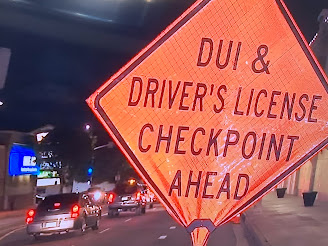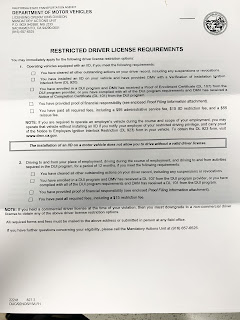In California if you are over 21 and arrested for driving under the influence of alcohol with a .08 or more the DMV will seek to suspend your driving privileges for up to 9 months administratively, assuming you have no priors, not on probation and submitted to a chemical test at the request of a peace officer.
Assuming you have not been convicted in Court for VC23152 or VC23153, once the suspension goes into effect you can get reinstated with a restricted license, here are the options available to you:
Option 1. Get reinstated immediately with the installation of an IID and a SR22. This is a device mounted in your vehicle that requires you to produce an alcohol free breath blow in order to start the car. This option allows for full non commercial driving privileges that allow you to drive anywhere you want anytime you want as long as you have the IID. This restriction runs for up to 6 months, after that you can get the IID removed and have your full license reinstated. You will need to also enroll in an approved alcohol program (AB541 at a minimum), obtain the proof of IID installation DL920, provide proof of financial responsibility by way of an SR22, then visit a local DMV office (appointment recommended) and pay the mandatory reinstatement fee of approximately $145
Option 2. Apply for an employment/treatment program restricted non-commercial license. This license allows you to drive only to and from and during course of employment and to and from the DUI classes. The benefit of this restriction is that is does not require an ignition interlock (IID). The restriction runs for up to 12 months and requires a 30 day “hard” suspension where you cannot drive at all. After the 30 days you can apply for the restriction as long as you get enrolled in an approved DUI program (AB541 minimum), obtain proof of financial responsibility (SR22), and visit a DMV office to pay the $145 reinstatement fee. This restriction lasts for up to 12 months after which time you can get your full license back.
It must be understood that both of the options above assume you have NOT been convicted in Court of DUI or DUI with injury. If you have been convicted in Court or believe you will be convicted in Court you may have similar options but the period of the restrictions run for a longer period of time.
If you choose not to take advantage of any of the restriction options you can simply ride out the suspension which lasts anywhere from 4-9 months and get reinstated thereafter once you have obtained an SR22 and paid the reissue fee.
Note: If you have a commercial license you must downgrade to a non-commercial license as your commercial driving privileges will be disqualified for a period of one year. Also, if you have any other holds such as FTA, child support or negligent operator suspensions then the above restriction options may not be available to you.
If you have any questions call Top California DUI Attorney Matthew Ruff for a consultation direct on his cell phone at 310-686-1533.








